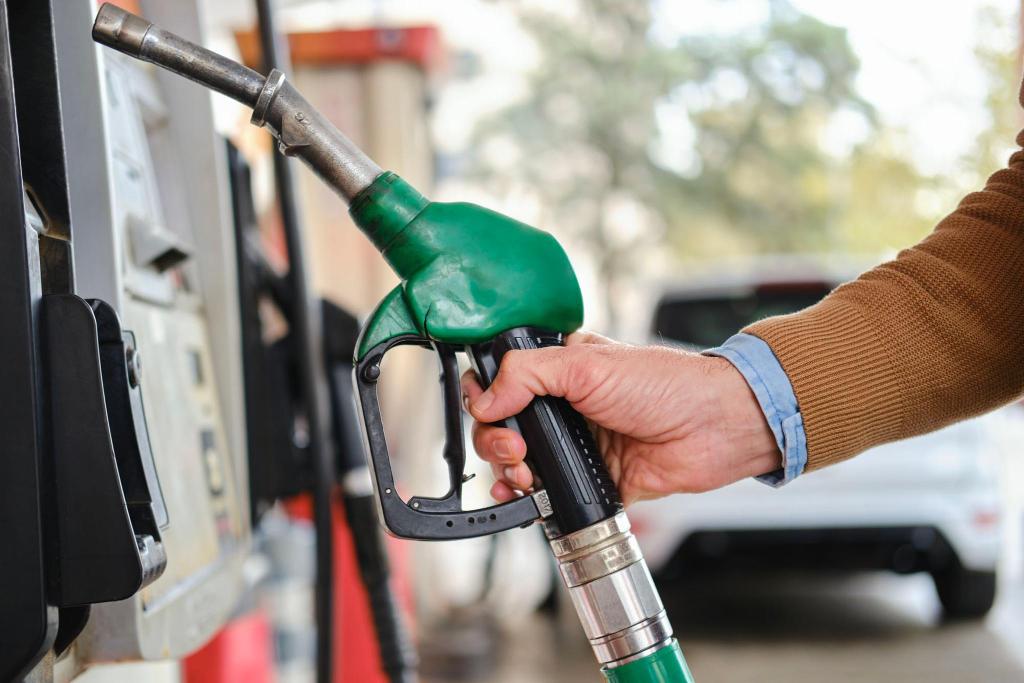
What Is a Fuel Policy?
Learn about rental car fuel policies and find out everything from full-to-full to prepaid options. Check out:
- How full your rental car's tank should be at pickup and return.
- Why you should document your fuel level with photos.
- How electric and hybrid vehicles have special requirements, including minimum battery charge levels.
What is a fuel policy? A fuel policy is the agreement between you and your rental car company about how to handle fuel during your rental period. It specifies how full the tank should be when you pick up and return the vehicle, and outlines any associated fees or requirements. Understanding your fuel policy helps avoid unexpected charges and ensures a smoother rental experience.
How can understanding my fuel policy help me?

Understanding your fuel policy in advance helps you plan your budget more effectively and avoid surprise charges at the end of your rental. It ensures you can choose the most cost-effective option for your trip while saving time during vehicle return. Most importantly, it helps prevent disputes about fuel levels with the rental company.
What sort of fuel policies are there?
Different rental companies offer various fuel policies, each suited to different travel needs:
- Full-to-full: you receive the car with a full tank and return it with a full tank. You pay for the fuel you use at market prices. This is typically the most flexible and economical option. Remember to keep fuel receipts as proof of refueling.
- Full-to-empty (pre-paid): you pay for a full tank upfront, often at a slightly reduced rate, and can return the car with any amount of fuel. While convenient for long trips, you don't receive credit for unused fuel. This usually costs more unless you return the car nearly empty.
- Same-to-same: return the car with the same fuel level as pickup. The fuel level is marked on your rental agreement, and this option is common for shorter rentals or if the rental company didn’t top-off your car after a previous rental. Take a photo of the fuel gauge at pickup for reference.
- Quarter tank policy: popular in some Asian countries, the car comes with and should be returned with a quarter tank. While less common in North America and Europe, this option can be helpful for short city rentals.
What fuel policy does my rental car have?

To identify your fuel policy, check your rental confirmation email and review the rental agreement before signing. Ask the counter agent to explain the policy if anything is unclear.
Important documentation tips
Proper documentation of your fuel levels and purchases helps protect you from potential disputes and unexpected charges.
- Take clear photos of the fuel gauge at pickup and dropoff
- Keep all fuel receipts from your final refuel
- Note the location of gas stations near the return location
Which fuel policy is right for my rental?
pg_image: “3 Which fuel policy is right for my rental.jpg ”
Consider the factors below when choosing a fuel policy.
- Full-to-full: works best when you're comfortable finding local gas stations and your schedule allows time for refueling. It's ideal for travelers who want to pay market rates for fuel and prefer maximum flexibility.
- Pre-paid fuel: makes sense if you're likely to use a full tank or have an early flight. Choose this option when convenience matters more than finding the lowest fuel price.
- Same-to-same: isn’t something you’ll typically choose – it’s something that the car rental company will give you if your vehicle isn’t already full. Full-to-full is a type of same-to-same.
Special considerations for electric and hybrid vehicles

Electric and hybrid vehicles have unique "fuel" policies.
- Pure electric vehicles: most rental companies require a minimum charge level at return. Some locations offer free charging, while others charge a flat rate for electricity. Always document the starting battery percentage and double check your rental agreement for specifics.
- Plug-in hybrids: follow standard fuel policy for the gas tank and note any additional requirements for battery charge. Check if charging cables are included and which charging networks are compatible with your rental.
- Cost considerations: electric charging costs vary for a full charge, though rates vary significantly by location and provider. Some rental locations offer complimentary charging, so factor this into your decision.
International fuel policy variations

When renting abroad, fuel policies may differ by country, and some regions may require prepayment. Be aware that fuel grades and types vary internationally, as do documentation requirements. Measurement units might also be different (liters vs. gallons).
To save money on international rentals, research local fuel prices before booking and learn local fuel grade terminology. Understanding local payment methods for fuel can also prevent unnecessary stress during your trip.
Remember that the most cost-effective policy depends on your specific travel plans, destination, and comfort level with local fueling options. Always read the terms carefully and ask questions if anything is unclear.

- Légitársaság jutalmak
- Repülési tippek
- Kalandos utazás
- Luxus utazás
- Utazás teljes időben
 The ultimate guide to European carry-on sizes2025. augusztus 4.
The ultimate guide to European carry-on sizes2025. augusztus 4. Essential Tips for Smart Car Rental Decisions2025. április 2.
Essential Tips for Smart Car Rental Decisions2025. április 2. Top 10 Rental Fails: Why People Don’t Get Their Hire Car2025. április 2.
Top 10 Rental Fails: Why People Don’t Get Their Hire Car2025. április 2. What Is an ‘SUV’ in Car Rental?2025. április 2.
What Is an ‘SUV’ in Car Rental?2025. április 2. 7 Airline Business Classes Compared2025. március 31.
7 Airline Business Classes Compared2025. március 31. Business Travel Tips: How to Stay Productive When Flying2025. március 31.
Business Travel Tips: How to Stay Productive When Flying2025. március 31. Can I Take My Hire Car on a Ferry?2025. március 28.
Can I Take My Hire Car on a Ferry?2025. március 28. Got an Unexpected Charge From Your Car Rental?2025. március 28.
Got an Unexpected Charge From Your Car Rental?2025. március 28. How Can I Get the Exact Hire Car That I Want?2025. március 28.
How Can I Get the Exact Hire Car That I Want?2025. március 28. How To Choose Best Economy Plane Seats for Extra Legroom2025. március 28.
How To Choose Best Economy Plane Seats for Extra Legroom2025. március 28. What Does Travel Insurance Cover? Everything You Need to Know2025. március 28.
What Does Travel Insurance Cover? Everything You Need to Know2025. március 28. What To Do if You’re on a Diverted Flight?2025. március 28.
What To Do if You’re on a Diverted Flight?2025. március 28. What To Take With You When You Pick Up Your Rental Car2025. március 28.
What To Take With You When You Pick Up Your Rental Car2025. március 28. Lost Luggage: What to Do if Your Checked Baggage Goes Missing2025. március 13.
Lost Luggage: What to Do if Your Checked Baggage Goes Missing2025. március 13. Understanding Rental Car Fees and Charges2025. február 25.
Understanding Rental Car Fees and Charges2025. február 25. How To Avoid Losing Your Rental Car Deposit2025. február 18.
How To Avoid Losing Your Rental Car Deposit2025. február 18. Car Rental Reviews: How Reviews Help You2025. február 14.
Car Rental Reviews: How Reviews Help You2025. február 14. Tips for Returning Your Rental Car if the Counter is Closed2024. december 30.
Tips for Returning Your Rental Car if the Counter is Closed2024. december 30. How to Travel with Bikes in a Rental Car: FAQs2024. december 29.
How to Travel with Bikes in a Rental Car: FAQs2024. december 29. 5-Minute Guide: Driving in the US2024. december 28.
5-Minute Guide: Driving in the US2024. december 28. 7 Easy Ways to Save Money on Car Rental2024. december 27.
7 Easy Ways to Save Money on Car Rental2024. december 27. How to Rent a Car for Your Ski Trip2024. december 27.
How to Rent a Car for Your Ski Trip2024. december 27. The Complete Guide To Airline Food2024. december 27.
The Complete Guide To Airline Food2024. december 27. How Old Do You Have to Be to Rent a Car?2024. december 26.
How Old Do You Have to Be to Rent a Car?2024. december 26. What is a Layover? A Complete Guide: Here’s What to Expect2024. november 24.
What is a Layover? A Complete Guide: Here’s What to Expect2024. november 24. How to Get into an Airport Lounge – Expert tips and Advice2024. július 24.
How to Get into an Airport Lounge – Expert tips and Advice2024. július 24. Standby Flights: What are They, and How do They Work?2024. július 24.
Standby Flights: What are They, and How do They Work?2024. július 24.
Talán ezek is tetszhetnek
Lost rental car keys? Learn what to do next and how to manage the situation effectively to minimize stress and costs.
Do you have to clean a rental car? These tips will help you keep vehicles clean during your travels and avoid unexpected cleaning charges afterward.
Finding a car rental with unlimited miles is easier than you think. These expert tips will help you enjoy your trip without worrying about extra fees.
Not sure if you should rent a manual car? In this guide, we discuss how different transmissions can suit your preferences and your license.
Find the perfect family car rental for your next road trip. Choose a vehicle that offers comfort, space, and reliability with our guide.
Navigate US car rental requirements and learn everything you need to know to rent a car as an international traveler.





